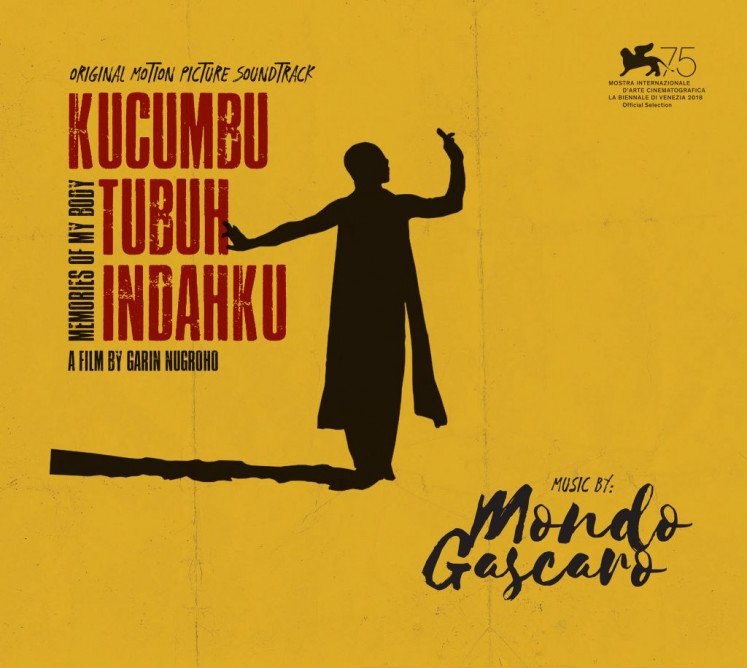Popular Reads
Top Results
Can't find what you're looking for?
View all search resultsPopular Reads
Top Results
Can't find what you're looking for?
View all search resultsMoody collection: Mondo Gascaro’s ‘Kucumbu’ soundtrack
Change text size
Gift Premium Articles
to Anyone
I
n the center of the gorgeous opening scene of Garin Nugroho’s latest film, a character study entitled Kucumbu Tubuh Indahku (Memories of My Body), the main character, a dancer named Rianto, tells a story of his past.
The monologue, spoken entirely in Javanese, confuses the line between facts and fiction — it’s a confession that masquerades as a tale.
Then mournful, playful strings play in the background, setting the mood for the movie. Right until the end of this paean to the human body — which tells the coming-of-age story of a boy named Juno — this mood remains stubborn, insistent. It’s the sound of a director, producer and the musical director realizing their shared vision.
That musical director, Mondo Gascaro, has charted a discography that rightfully belongs in Indonesia’s musical tapestry. He was the musical engine behind the indie band Sore. Since then, we have heard him fine-tune his attention to detail, the love he reserves for layers and a certain mood. That mood, jazzy and sultry, is a nice addition to Kucumbu Tubuh Indahku.
Moody collection: Music director Mondo Gascaro composes the soundtrack for Garin Nugroho's 'Kucumbu Tubuh Indahku' (Memories of My Body). (Courtesy of Mondo Gascaro/-)Mondo composed the soundtrack, which seesaws between monologues, old-timey songs from the 1950s and one original song entitled “Dari Seberang” (From Across).
Mondo said at an event that the music would have to be sourced from 1950s Indonesia, as it would make sense for the character’s story arc. On the soundtrack, Mondo might as well have created an hour-long composition, spliced to give room to the vocalists and the monologues.
Mondo’s music was born out of a tradition — particularly that of Indonesian retro-pop. This is apparent in both of Sore’s albums before his departure, Centralismo and Ports of Lima.
He’s a savant, both as a musician and as someone who directs them. His own solo album, Rajakelana, retains this signature sound.
The soundtrack to Kucumbu Tubuh Indahku is a moody extension to his discography — that it lands in conjunction with a marvelous film is surely a bonus.
One of the ways that directing was such a natural space for Mondo to be in is how he handles his vocalists.
Pop singer Danilla, singing a song called “Bimbang Tanpa Pegangan” (Confused Without a Crutch) from another soundtrack of the restored version of the movie Tiga Dara (Three Women), achieves a delightful balance with her signature husk.
Keroncong singer Endah Laras (who plays Juno’s aunt in the movie) sings the Ismail Marzuki-penned “Hanya Semalam” (Only for the Night) with pleasant ease. It’s almost like a lullaby you’d stay up for.
Much like the movie, Mondo applies patience throughout the album. This explains the subtle strings and the careful build-ups (particularly in the instrumental “Into the Clouds, Out of the Ocean”, a song from Rajakelana).
Centralismo’s mood, the reason behind its success, returns, making this soundtrack a fully realized collection. You’d be forgiven to think that Mondo took some cues from Radiohead instrumentalist Jonny Greenwood’s soundtrack work.
The album ends with the Inggrid Widjanarko-penned “Apatis” (Apathy), which earned its popularity from having Benny Soebardja sing it and from being featured in the much-lionized collection of the Lomba Cipta Lagu Remaja contest from the late 1970s. Mondo sings this song, taking cues from Benny’s playful and menacing vocals.
Watching the movie, which ends with the adult Juno silently reckoning with his future and “Apatis” playing in the background, I’m reminded of how the song fits in with the movie. It is also about looking ahead at an uncertain future:
“Roda roda terus berputar (the wheels keep turning)
"Tanda masih ada hidup (means there’s still a sign of life)
"Karena dunia belum henti (because the world hasn’t stopped)
"Berputar melingkar searah (circling around).”
With the soundtrack, Mondo once again finds a rich meaning behind his affinity for details — much like the movie it calls home. (ste)












